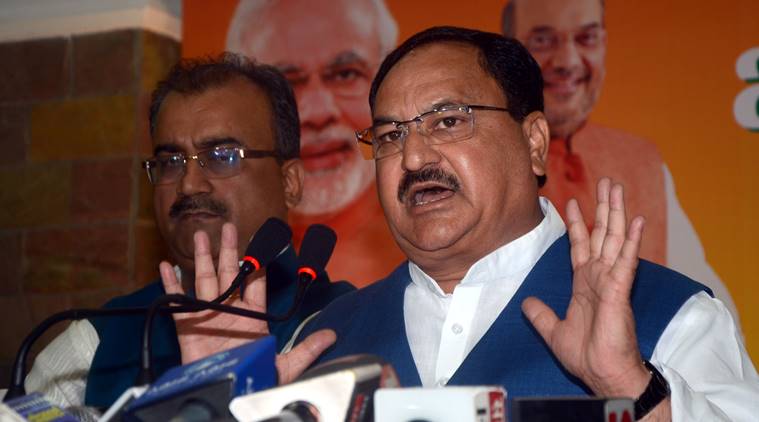Health Ministry proposal to curb substandard drugs, antibiotics overuse in limbo
Last year, two Union ministers and 10 MPs had forwarded objections from a drug traders’ lobby to HealthMin.
 Union health minister JP Nadda addressing press conference. Express File Photo by Pradeep Kumar
Union health minister JP Nadda addressing press conference. Express File Photo by Pradeep Kumar
A proposal of the Union health ministry that envisaged digitisation of the pharmaceutical supply chain to combat substandard drugs, curb on overuse of antibiotics and regulation of online sale of medicine is hanging fire over 12 months after it was initially announced. The Indian Express has learnt that last year, two Union ministers and 10 members of Parliament (MPs) forwarded objections of the All India Organisation of Chemists and Druggists (AIOCD), a lobby group of drug traders, on the proposed regulation of sale of drugs in the country to Union Health Minister J P Nadda.
Out of the 10 MPs, eight are from the Bharatiya Janata Party (BJP). Under the regulations, the ministry proposed on March 16 last year that an e-platform would be established to keep a track record of every medicine manufactured and sold in India. The AIOCD, which is the largest body of drug traders in India with more than eight lakh members, had written a six-page letter to Nadda on April 6, 2017, wherein it stated that the proposed regulations “if enforced, would only encourage Inspector Raj in the country” and “would be a wasteful exercise”.
Human Resource Development Minister Prakash Javadekar wrote a letter to Nadda on May 24, 2017, wherein he attached the AIOCD letter and requested him to take “appropriate action” on it. Also, Sudarshan Bhagat, the then Minister of State for Agriculture and Farmers Welfare, wrote a letter to Nadda on June 14, 2017, wherein he attached the AIOCD letter and stated: “I am forwarding this letter to you for consideration and future course of action”. Bhagat is currently the Minister of State for Tribal Affairs.
Nadda, Javadekar and Bhagat did not respond to the queries sent by The Indian Express.
According to a study by the World Health Organization (WHO) in November last year, about 10 per cent of the medicines consumed in low- and middle-income countries, including India, are “substandard and falsified”. In February last year, a two-year-long nationwide survey was conducted under the supervision of the Central government, which found that around 10 per cent of the drugs in the government supply chain are “not of standard quality”. This survey found around 3 per cent of drugs in retail supply chain substandard.
On March 16, 2017, the Ministry of Health and Family Welfare (MoHFW) issued a public notice, which proposed that an electronic platform will be developed where every stakeholder in the pharmaceutical supply chain — such as manufacturer, stockist, wholesaler, distributor and chemist — will have to register itself. Moreover, the public notice stated that each chemist and online pharmacy outlet “will be required to enter all details of the medicines received, sold, returned to the manufacturer or disposed of in any other manner”.
For drugs that require a doctor’s prescription, the notice added that the chemist will have to enter the registration number or identity number of the doctor who wrote the prescription. The ministry stated in its notice that the objective of such regulation would be to “ensure availability of right drugs that meet the standards of quality to every person”, curb anti-microbial resistance (AMR) and regulate online “supply” of medicines. Over-consumption of an antibiotic drug leads to AMR, which means the bacteria becomes immune to that particular drug.
In its April 6 letter to Nadda, the AIOCD stated that the proposed regulations are going to be “painful and cumbersome for all the traders and at the same time, this will not be of any help in achieving the objective of ensuring availability of quality drugs to patients”. Additionally, it “strongly objected and advised not to allow sale of medicines on internet in India”. Noting some of the paragraphs of public notice where regulation of online pharmacies has been proposed, the AIOCD stated that it indicates that the government has decided to allow online pharmacies in India.
The AIOCD did not respond to the queries sent by The Indian Express.
The eight BJP MPs who forwarded the AIOCD objections to Nadda are: Chintamani Malviya, Kambhampati Hari Babu, Mohanbhai Kundariya, Basawaraj Patil, Jyoti Dhurve, Dinesh Kashyap, Sudhir Gupta and Yashwant Singh. Y S Avinash Reddy, who has been elected from YSR Congress Party, as well as Dhananjay Mahadik, who is an MP from the Nationalist Congress Party (NCP), also forwarded the AIOCD letter to Nadda.
None of the 10 MPs responded to the queries sent by The Indian Express.
According to a senior government official, Nadda has responded to each of the aforementioned ministers and MPs and told them that he would “investigate all the suggestions and opinions received on this drug sale regulation and then form a thoughtful viewpoint”.
Prashant Tandon, president of the India Internet Pharmacy Association (IIPA), said: “The public notice mentioned is over a year old. Since then, there have been multiple stakeholder consultations in the MoHFW and further deliberations post the feedback received from all parties, including IIPA. At this stage, we are awaiting the subsequent draft and would share our comments once it is released. The MoHFW has taken a supportive stance towards the concerns raised and has been holding regular discussions.”
Tandon, who is also co-founder of online pharmacy 1mg.com, added that the health ministry’s public notice was of a much broader scope with the primary intent of “digitisation of the entire pharma supply chain, and ensuring trackability and traceability of pharmaceutical products from the manufacturer to the consumer”. He further stated: “We do believe the intent is right, and it did require that all pharmacies, online and offline, manage a full track of every product sold and prescription on which dispensation was made. As e-pharmacy players, we anyway have the full track and trace systems. However, the retail pharmacy ecosystem in India needs a significant overhaul before it can move to that level, hence there were feasibility concerns around implementation.”








- 01
- 02
- 03
- 04
- 05























